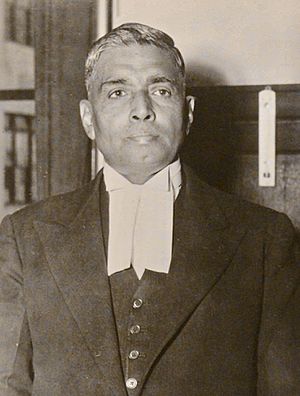Radhabinod Pal facts for kids
Quick facts for kids
Radhabinod Pal
|
|
|---|---|
 |
|
| Born | 27 January 1886 |
| Died | 10 January 1967 (aged 80) Calcutta, India
|
| Nationality | Indian |
| Alma mater |
|
| Occupation | Jurist |
| Known for | Tokyo Trial |
| Awards | Padma Vibhushan |
Radhabinod Pal (27 January 1886 – 10 January 1967) was an Indian jurist who was a member of the United Nations' International Law Commission from 1952 to 1966. He was one of three Asian judges appointed to the International Military Tribunal for the Far East, the "Tokyo Trials" of Japanese war crimes committed during the Second World War. Among all the judges of the tribunal, he was the only one who submitted a judgment which insisted all defendants were not guilty. The Yasukuni Shrine and the Kyoto Ryozen Gokoku Shrine have monuments specially dedicated to Pal.
Career
Radhabinod Pal was born in 1886 in the village of Salimpur, Kushtia District in Bengal Presidency, British India (present-day Bangladesh). He passed the Entrance Examination in 1903, and F.A Examination in 1905 from Rajshahi College with distinctions. Radhabinod Pal took his BA Honors (1907) and MA (1908) in Mathematics from the Presidency College, Calcutta. Pal worked as a clerk at the Allahabad Accountant General Office before he took his BL degree in 1911. Pal later served as a lecturer in Mathematics at the Ananda Mohan College, Mymensingh. Alongside his teaching, Pal also practiced law at the Mymensingh Bar. While in Mymensingh, Pal further stretched his legal qualifications by obtaining the LLM degree (1920) from Calcutta University. He stood First in the First Class. Pal then moved to Calcutta to build a legal career in the High Court.
He studied mathematics and constitutional law at Presidency College, Calcutta (now Kolkata), and the Law College of the University of Calcutta.
Pal was a major contributor to the formulation of the Indian Income Tax Act of 1922. The British Government of India appointed Pal as a legal advisor in 1927. He worked as professor at the Law College of the University of Calcutta from 1923 till 1936. Pal became a judge of the Calcutta High Court in 1941 and Vice-Chancellor of the University of Calcutta in 1944.
He was asked to represent India as a member of the tribunal of judges officiating at the Tokyo Trials in 1946. In deliberations with judges from 10 other countries, Pal was highly critical of the prosecution's use of the legal concept of conspiracy in the context of pre-war decisions by Japanese officials. He also maintained that the tribunal should not retrospectively apply (nulla poena sine lege) the new concept of Class A war crimes – waging aggressive (also known as crimes against peace) – and crimes against humanity (that had already been used ex post facto at the Nuremberg Trials). Hence Pal dissented from the tribunal's verdicts of guilt in the cases of defendants charged with Class A war crimes. His reasoning also influenced the judges representing the Netherlands and France, and all three of these judges issued dissenting opinions. However, under the rules of the tribunal, all verdicts and sentences were decided by a majority of the presiding judges.
Personal life
Pal was the father of nine daughters (Shanti Rani, Asha Rani, Leela Rani, Bela Rani, Nilima, Roma Rani, Renu Kana, Lakshmi Rani and Smriti Kana) and five sons (Prasanta Kumar, Pradyot Kumar, Pronab Kumar, Pratip Bijoy and Pratul Kumar). One son, Pronab Kumar Pal, also became a lawyer (a barrister), as did his two sons-in-law, Balai Lal Pal (with whom he co-authored a book) and Debi Prasad Pal (who also served as a judge of the Calcutta High Court and Indian Minister of State for Finance).
See also
 In Spanish: Radhabinod Pal para niños
In Spanish: Radhabinod Pal para niños


